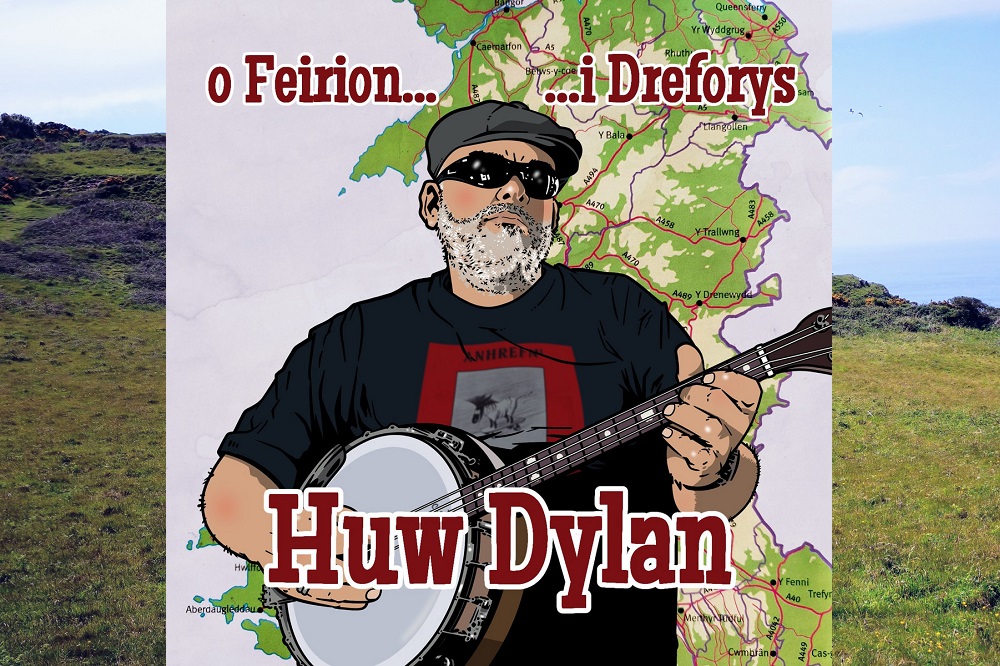Review: O Feirion…i Dreforys is a loose, zig-zagging musical travelogue connecting Dolgellau with Morriston

Jon Gower
If a pint of Guinness had a voice it might well sound like Huw Dylan Owen on this new album – velvety, dark and very sustaining. The album is a loose, zig-zagging musical travelogue connecting his native Dolgellau, in the shadow of the lofty heights of Cadair Idris in Meirionydd, with his home nowadays in Morriston on the northern edge of Swansea. Meanderingly he taking in various places en route, such as Usk, Cardiff and Pontypridd. As a brief poetic promissory note on the album sleeve says “Ar hyd heol hudolus _ am ennyd/Dymunaf eich tywys,’ which in loose translation suggests ‘Along a magical road, for a moment/I desire to lead you.’ As he then does.
Huw Dylan, a poet and also the author of a book about Welsh folk sessions, has been involved with various musical outfits over the years such as Gwerinos, Mari Lwyd and Yr Alltud and this time he doesn’t go entirely solo, as his lived-in voice is joined on certain tracks by the silver chimes of Heledd and Mirain Owen’s voices.
Some tracks on this peregrinating album, such as ‘Cregennan’ are simple folk melodies complete with, or maybe competing against sonorously reverberating guitar while on others the words are simply recited or incanted over the music, the words themselves often composed in flowing cynghanedd. Indeed Huw Dylan Owen is poet enough to create some lyrics by simply stringing englynion together, which is no mean feat, while on a song such as ‘Llwydwyll Gwareiddiad Llydaw’ he takes ones by that master of the form, Gerallt Lloyd Owen to conjure up the emptying life of an old woman in Brittany, as the fine lace of her culture unravels.
Haunting
There is a similar, haunting sadness that inhabits ‘Cau’r Hen Le,’ (Shutting the Old Place) which depicts an old lady as she shuts up the house for the last time, with goosebumps on her skin and her conscience weighing heavily. One can imagine a long, long poetic connection with the echoing emptiness of the medieval poet Llywarch Hen’s portrayal of the halls of the Cynddylan, now silent after so much merriment and companionship. This unnamed woman similarly remembers a society that can no longer remember the dawn, in which it’s impossible to even remember the communal singing and the laughter. Despite its aching feeling of threnody, of lament, it’s a lovely, lovely song, not least when the singer harmonises with himself, two baritone rivers conjoining.
‘Mudo,’ meanwhile, tracks the long, transcontinental journey of a migrant bird Soweto in South Africa and thence over the Sahara and Morocco, with a late burst of percussion mirroring the metronome beats of the small bird as it flies in to a temporary home under the house eaves somewhere in Wales.
A long and shabby moment in history animates ‘Gwenllian.’ Following the death of Llywelyn ap Gruffudd, the last native prince of Wales, his daughter, along with other family members were confined for life to remote priories in Lincolnshire. In the case of Gwenllian she died 54 years after first being taken prisoner, and this simple, tender song portrays this attack on the innocent and acts as both testament and commemoration of a forgotten lady.
The album plays out with a jaunty live number called ‘Eirth’ in a recording from a concert at the Tyrfa Tawe festival at the National Waterfront Museum. Just as fellow poet and troubadour Twm Morys – who shares a similar voice and flair for versifying – often sings about hares, here Hyw Dylan Owen sings about the beloved bears of his childhood, now removed, now long gone. It’s a good upbeat ending to an album by a natural rover, taking folk music for a walk along new paths, full of beautiful turns and sudden, unexpected vistas.
You can purchase O Feirion…i Dreforys here.
Support our Nation today
For the price of a cup of coffee a month you can help us create an independent, not-for-profit, national news service for the people of Wales, by the people of Wales.








Morriston is on the northern edge of Swansea.